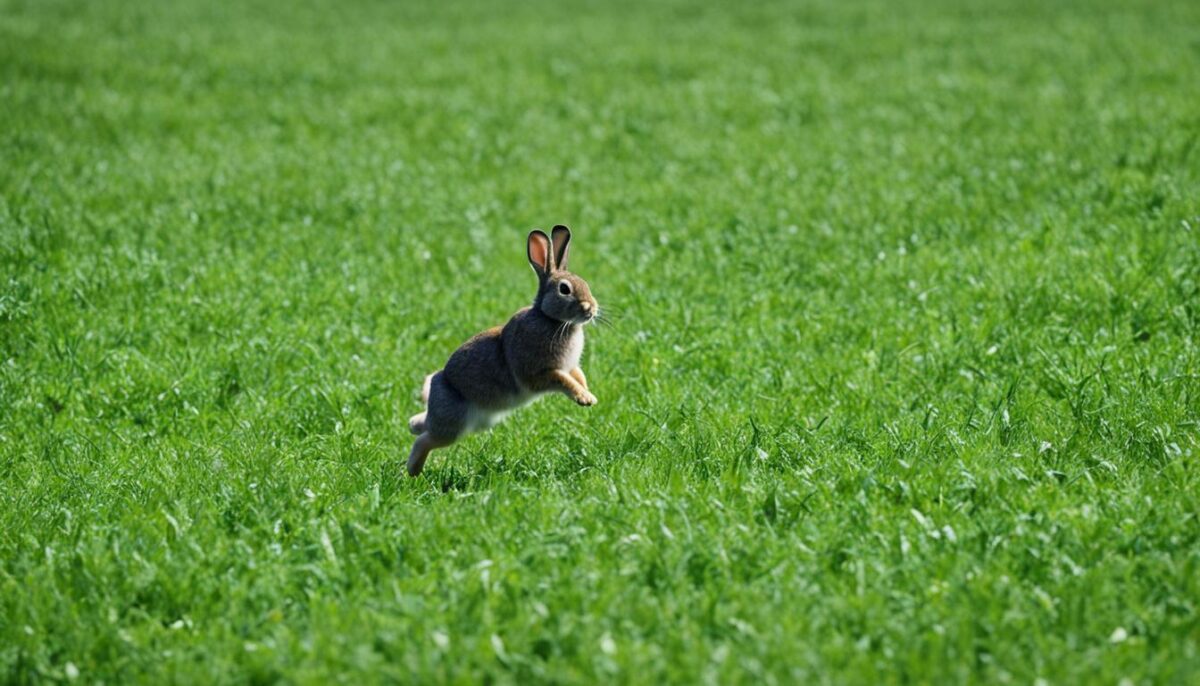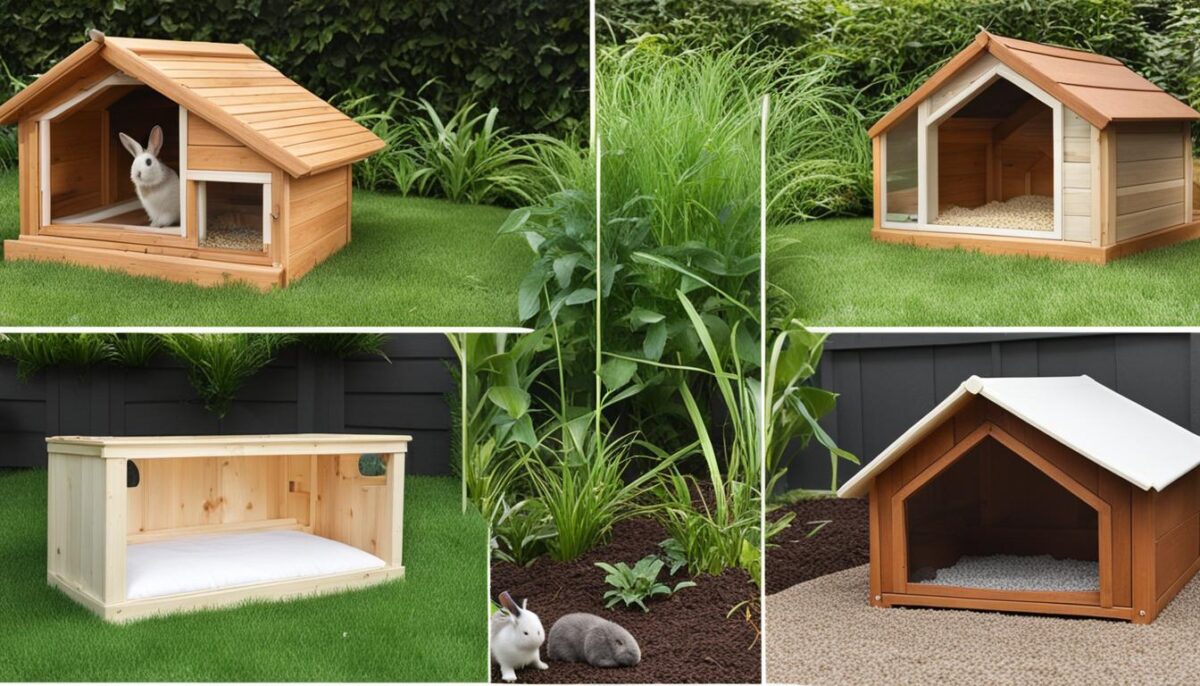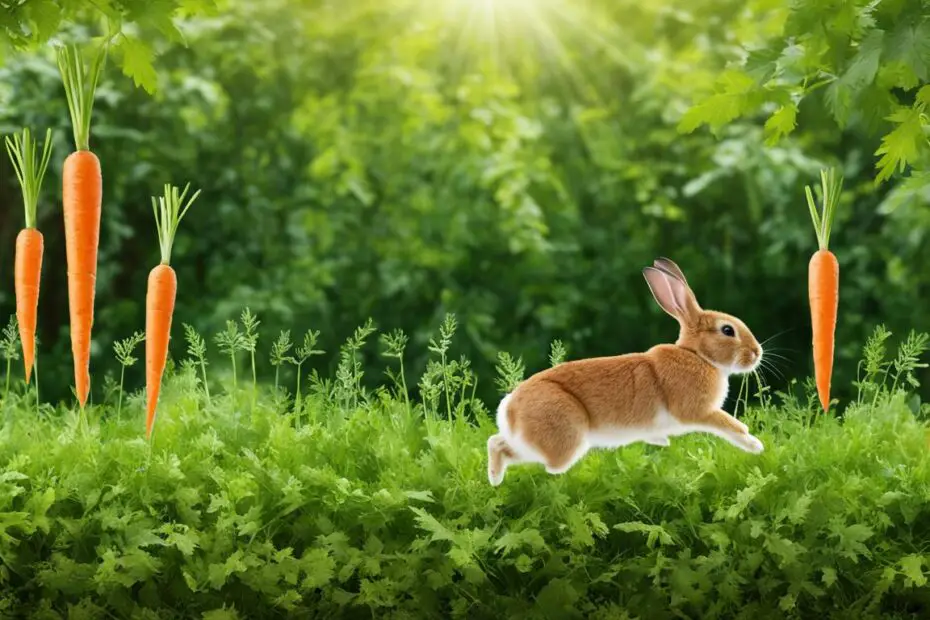Have you ever wondered how long rabbits can live? Whether you’re a proud rabbit owner or considering adopting one, understanding a rabbit’s lifespan is essential for providing them with the best care possible. Rabbits are fascinating creatures that can bring joy and companionship, so let’s dive into the topic of rabbit lifespan.
Rabbits can live anywhere from 6 to 18 years, depending on various factors. The average lifespan of rabbits in captivity is around 8 to 12 years. However, with the right care and attention, some rabbits have been known to live even longer. It’s important to note that rabbits live shorter lives in the wild due to predators and other environmental risks.
There are several factors that can affect a rabbit’s lifespan. These factors include their breed, size, diet, living conditions, and veterinary care. By understanding these factors, you can make informed decisions to ensure that your pet rabbit lives a long and healthy life.
Key Takeaways:
- Rabbits can live anywhere from 6 to 18 years, with the average lifespan being around 8 to 12 years.
- Rabbit lifespan is influenced by factors like breed, size, diet, living conditions, and veterinary care.
- Proper care and attention can help rabbits live longer and healthier lives.
- Rabbits live shorter lives in the wild due to predators and other environmental risks.
- By understanding the factors affecting rabbit lifespan, you can provide the best care for your furry friend.
Factors Affecting Rabbit Lifespan
Several factors can influence the lifespan of a rabbit. Understanding these factors can help you ensure that your pet rabbit lives a longer and healthier life. Let’s take a look at some of the key factors that play a role in a rabbit’s lifespan:
Breed and Size
Breed: The breed of a rabbit can affect its lifespan. Smaller breeds tend to live longer than larger breeds. For example, dwarf rabbits have a longer average lifespan compared to giant breeds. It’s important to consider the breed when choosing a pet rabbit.
Size: The size of a rabbit is also a determining factor in its lifespan. Smaller breeds generally have fewer health problems and tend to live longer than larger breeds.
Diet and Nutrition
A healthy diet is crucial for a rabbit’s overall well-being and longevity. A well-balanced diet consisting of fresh vegetables, grass hay, and a small portion of fruit provides the necessary nutrients for optimal health. Avoid feeding your rabbit sugary treats and high-fat foods, as they can lead to obesity and other health issues.
Living Environment
The living environment of a rabbit can significantly impact its lifespan. Indoor housing provides a safer and more controlled environment compared to outdoor housing. Indoor rabbits are protected from extreme weather conditions, predators, and parasites. However, outdoor rabbits can benefit from natural grazing and mental stimulation. Consider the specific needs and safety of your rabbit when choosing the most suitable living environment.
Exercise and Mental Stimulation
Regular exercise and mental stimulation are essential for a rabbit’s physical and mental well-being. Daily exercise helps maintain a healthy weight, improves digestion, and prevents boredom. Provide suitable toys and create a stimulating environment to keep your rabbit mentally engaged.
Spaying or Neutering
Spaying or neutering your rabbit can have a positive impact on their health and lifespan. It helps prevent reproductive health issues and reduces the risk of certain types of cancers. Consult with a veterinarian about the best time to spay or neuter your rabbit.
By considering these factors and providing proper care, you can help ensure that your pet rabbit lives a longer and happier life.

Breed and Size: How They Affect Lifespan
The breed and size of a rabbit play a significant role in determining its lifespan. Generally, smaller breeds tend to live longer than larger breeds. For example, dwarf rabbits have the longest lifespan, while giant breeds have the shortest lifespan. This difference in lifespan can be attributed to various factors, including genetics, metabolism, and susceptibility to certain health conditions.
When considering a pet rabbit, it’s essential to choose a breed that aligns with your desired lifespan expectations. Smaller breeds, such as the Netherland Dwarf or Holland Lop, can live up to 10-12 years or even longer with proper care. On the other hand, larger breeds like the Flemish Giant or French Lop may have a lifespan of around 5-7 years.
It’s important to note that individual rabbits within a specific breed can also have variations in lifespan. Factors such as genetics, nutrition, and overall care can influence how long an individual rabbit lives, even within the same breed.
Health Issues and Lifespan
Certain breeds may be more prone to specific health problems that can impact their lifespan. For example, dwarf breeds are more susceptible to dental issues due to their small mouths and crowded teeth, which can negatively affect their overall health and lifespan. It’s crucial to be aware of these breed-specific health concerns and take appropriate preventive measures to ensure the well-being and longevity of your pet rabbit.
Regular veterinary check-ups, proper nutrition, and attentive care can help mitigate the impact of breed-related health issues and increase the lifespan of your rabbit. Maintaining a healthy weight, providing a balanced diet, and ensuring a clean living environment are essential aspects of promoting a long and happy life for your pet.
Rabbit Breed Lifespan Comparison
| Breed | Lifespan |
|---|---|
| Netherland Dwarf | 10-12 years |
| Holland Lop | 10-12 years |
| Lionhead | 8-10 years |
| Dutch | 5-8 years |
| Flemish Giant | 5-7 years |
Table: Lifespan comparison of popular rabbit breeds. Please note that these lifespans are approximate and can vary depending on individual care and other factors.
Choosing the right breed and understanding how size can influence lifespan is an important consideration when bringing a rabbit into your family. By selecting a breed that aligns with your desired lifespan expectations and providing proper care, you can ensure that your pet rabbit lives a healthy and fulfilling life.
Diet and Nutrition: Key to a Long Life
Proper diet and nutrition are essential for a rabbit’s overall health and longevity. By providing the right diet, you can ensure that your pet rabbit lives a longer and healthier life. Here are some key considerations for rabbit diet and nutrition:
A Well-Balanced Diet
A well-balanced diet is crucial for meeting a rabbit’s nutritional needs. It should include:
- Grass hay: Hay should make up the majority of a rabbit’s diet. It provides essential fiber for maintaining a healthy digestive system and helps wear down their continuously growing teeth. Timothy hay, orchard grass, or meadow hay are good options.
- Fresh vegetables: Leafy greens like romaine lettuce, kale, and cilantro are rich in vitamins and minerals. Offer a variety of vegetables to provide a diverse range of nutrients.
- A small portion of fruit: While fruit should be given sparingly due to its sugar content, a small amount can be offered as a treat. Strawberries, apples, and blueberries are rabbit-friendly options.
Did You Know? Rabbits have a unique digestive system that requires a constant supply of fiber to function properly. Without enough fiber, they can develop serious health problems like dental issues and gastrointestinal stasis.
It’s important to avoid feeding rabbits sugary treats and high-fat foods. These can lead to obesity and other health issues. Additionally, rabbits should always have access to fresh, clean water.
An Image of a Rabbit Enjoying a Healthy Meal

Providing a varied and balanced diet is crucial for maintaining your rabbit’s health and promoting a longer lifespan. Consult with a rabbit-savvy veterinarian or an experienced rabbit owner to ensure you are meeting all of your rabbit’s nutritional needs.
Living Environment: Indoor vs. Outdoor Housing
The living environment plays a crucial role in determining a rabbit’s lifespan. The choice between indoor and outdoor housing can have significant impacts on their health and well-being. Let’s explore the advantages and considerations of each option.
Indoor Housing:
Indoor housing provides a safe and controlled environment for rabbits, shielding them from harsh weather conditions, predators, and parasites. It allows you to closely monitor their living conditions and maintain a consistent temperature, which is vital for their health. Indoor rabbits also have reduced exposure to infectious diseases and are less susceptible to injuries.
Outdoor Housing:
While outdoor housing offers natural grazing opportunities on grass and mental enrichment from the surrounding environment, it comes with its own set of challenges. Rabbits in outdoor housing are exposed to temperature fluctuations, which can be stressful and impact their longevity. Additionally, the risk of predation and diseases increases in an outdoor setting.
Providing the Best of Both Worlds:
An optimal solution is to create a safe and supervised outdoor enclosure for your rabbit. This way, they can enjoy the benefits of fresh air, grass, and mental stimulation while still having the safety and comfort of an indoor living environment. Supervised outdoor time can contribute to a rabbit’s overall happiness and well-being.
The Importance of Proper Shelter and Security
When providing outdoor housing, it’s crucial to ensure that the enclosure is secure, predator-proof, and well-maintained. Additionally, rabbits need access to a cozy and insulated shelter within the enclosure to retreat to during extreme weather conditions.
Summary:
When deciding between indoor and outdoor housing for your rabbit, consider the potential risks and benefits. While indoor housing provides a safer and more controlled environment, outdoor housing can offer natural grazing and mental enrichment. To strike a balance, consider creating a supervised outdoor enclosure that combines the advantages of both options.
| Indoor Housing | Outdoor Housing | |
|---|---|---|
| Advantages | Protection from harsh weather and predators | Natural grazing and mental enrichment |
| Considerations | Potential for limited exercise and mental stimulation | Risk of temperature fluctuations, predation, and diseases |
| Best Practice | Supervised outdoor time in a secure enclosure | N/A |

Exercise and Mental Stimulation
Exercise and mental stimulation are crucial for maintaining a rabbit’s overall health and well-being. Providing regular opportunities for exercise and mental enrichment not only keeps rabbits physically fit but also promotes their mental and emotional well-being.
Rabbits should have daily opportunities for exercise, allowing them to stretch their legs and engage in natural behaviors. Whether indoors or outdoors, creating a safe and rabbit-friendly space for them to explore and play is essential. Free-roaming in a designated area indoors or a well-secured outdoor enclosure can provide the necessary space for exercise.
Exercise is particularly important for a rabbit’s digestive system. It helps in maintaining a healthy gastrointestinal function, preventing issues like gastrointestinal stasis. Additionally, regular exercise helps prevent obesity, which can lead to various health problems and a shortened lifespan.
To provide mental stimulation, rabbits benefit from a variety of toys, interactive activities, and environmental enrichment. Toys such as chewing toys, puzzle toys, and tunnels can keep them engaged and mentally stimulated. Playing with your rabbit and offering opportunities for exploration and interaction with their surroundings can also help meet their mental stimulation needs.
It’s important to tailor exercise and mental stimulation activities based on your individual rabbit’s preferences and abilities. Some rabbits may enjoy agility exercises or obstacle courses, while others may prefer digging and burrowing activities. Observing your rabbit’s behavior and preferences can help you choose the most engaging and appropriate activities.
By ensuring that rabbits get enough exercise and mental stimulation, you contribute to their overall longevity and well-being. The combination of physical activity and mental engagement supports their physical health, prevents boredom, and enhances their overall quality of life.
Conclusion
After considering various factors such as breed, size, diet, living conditions, and veterinary care, it is clear that rabbits can live between 6 to 18 years. Smaller breeds generally have a longer lifespan compared to larger breeds. However, proper care and attention are essential for a rabbit’s longevity.
Providing a well-balanced diet, consisting of grass hay, fresh vegetables, and limited fruit, is vital for maintaining a rabbit’s health. Regular exercise and mental stimulation also play a significant role in promoting a longer lifespan. Rabbits require opportunities to roam and explore, either indoors or in a controlled outdoor environment, to keep their bodies and minds active.
In addition to diet and exercise, the living environment is crucial to a rabbit’s overall well-being. Indoor housing provides a safer and more controlled setting, protecting rabbits from external elements and potential hazards. Nevertheless, outdoor housing can offer natural grazing opportunities and mental enrichment.
By providing optimal care, meeting their specific needs, and seeking regular veterinary check-ups, you can ensure that your pet rabbit lives a fulfilling and happy life for many years to come. Remember, a rabbit’s lifespan can vary, but with the right care and attention, you can contribute to their longevity and create wonderful memories together.
FAQ
How old do rabbits live?
Rabbits can live anywhere from 6 to 18 years, depending on various factors.
What factors affect a rabbit’s lifespan?
Factors that affect a rabbit’s lifespan include their breed, size, diet, living conditions, and veterinary care.
How does breed and size affect a rabbit’s lifespan?
Smaller breeds generally live longer than larger breeds.
What should be included in a rabbit’s diet for a long life?
A well-balanced diet that includes grass hay, fresh vegetables, and a small portion of fruit is essential for a rabbit’s longevity.
Does the living environment impact a rabbit’s lifespan?
Yes, the living environment can impact a rabbit’s lifespan. Indoor housing generally provides a safer and more controlled environment for rabbits.
How important is exercise and mental stimulation for a rabbit’s lifespan?
Exercise and mental stimulation are essential for maintaining a rabbit’s overall health and well-being, thus contributing to their longevity.
What is the average lifespan of rabbits?
The average lifespan of rabbits ranges from 6 to 12 years.
How can I ensure my pet rabbit lives a long and healthy life?
You can ensure your pet rabbit lives a long and healthy life by considering factors such as breed, size, diet, living conditions, and providing proper veterinary care.
Do smaller breeds of rabbits live longer?
Yes, smaller breeds of rabbits tend to live longer than larger breeds.
What should be avoided in a rabbit’s diet to prolong their lifespan?
Feeding rabbits sugary treats and high-fatty foods should be avoided to promote a longer lifespan.


